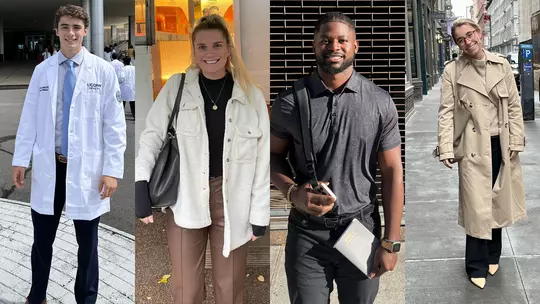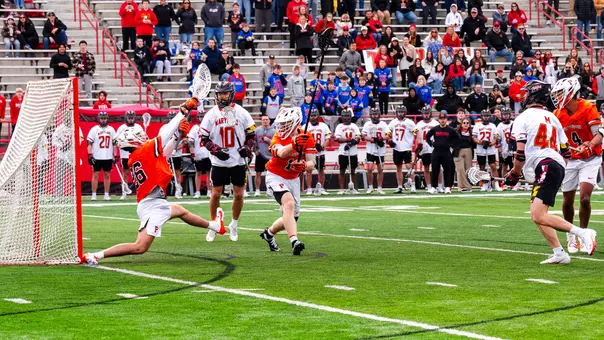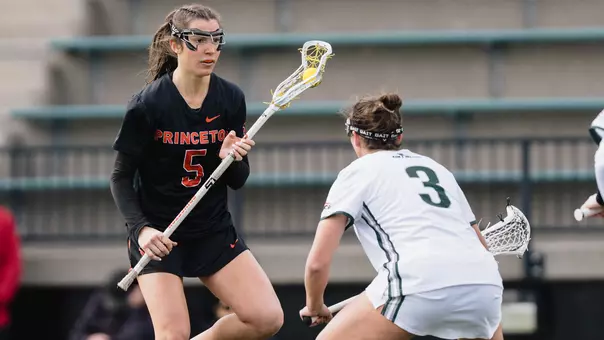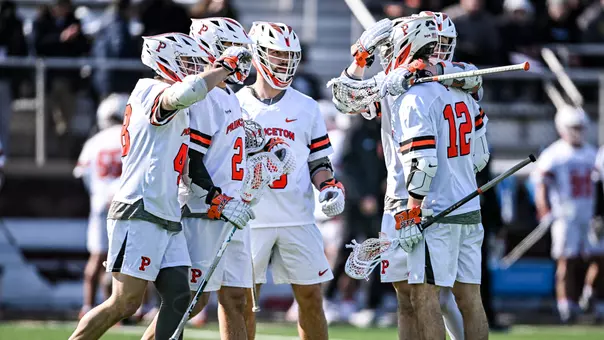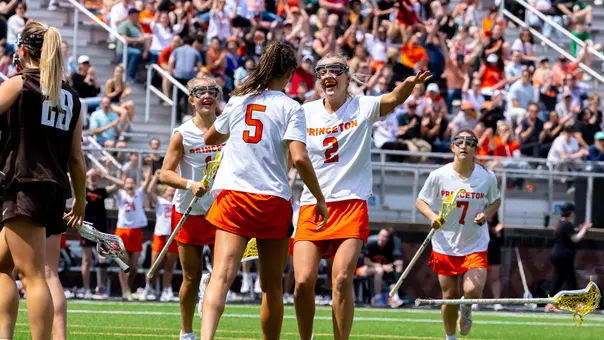Princeton University Athletics
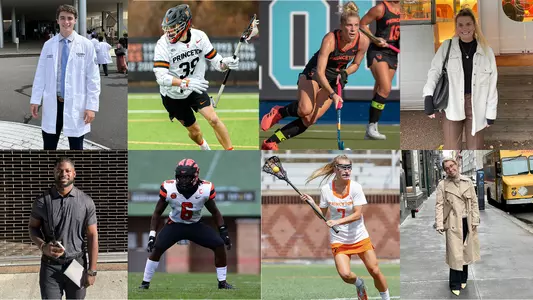
Feature Story: When "I Am" Becomes "I Was"
November 07, 2023 | Field Hockey, Football, Men's Lacrosse, Women's Lacrosse
The sand runs, never stopping, never slowing, always without feeling. When the last grain falls, there is no resetting the hourglass.
“I am” has become “I was.”
* * *
It’s a little past the lunchtime rush at this gourmet food court in Hartford, and yet Weston Carpenter is waiting. He is at the Puerto Rican stand; his order is a chili chicken rice bowl.
Five minutes go by. Ten. Is that a long time for him? Time is something so easy to measure, and yet, for Weston Carpenter, the answer to that simple question — is 10 minutes a long time — depends solely on which direction he’s facing.
Looking ahead? It’s nothing. He is a few weeks into this first year at the University of Connecticut Medical School. Time for him as he faces his future is measured not in minutes but in years. Two years of classes. Two years of rotations. Multiple years of residencies, internships, fellowships. Come back in 10 years and then see where Dr. Carpenter is.
In the present? Every minute is precious. He goes to classes. He studies … and studies … and studies. He tries to fit in everything else, like sleep, and exercise, and some semblance of a social life.
Carpenter now has his lunch, and he sits down to spend some of this valuable commodity — minutes — talking about what it’s like to be starting out med school. He mentions his classes, how they work at UConn, how each day starts with a quiz. He talks about subjects that fall under different acronyms like “CORE” and “VITAL” and “FABLAB,” how he’s learning about anatomy and physiology, biochemistry, pathology, histopathology and everything else that goes into training doctors.
He does this for a good 15 minutes. That’s when he takes his third different look at time, this time facing backwards. Again, a minute is always 60 seconds … or is it? Time can warp depending on your perspective.
“I can’t believe,” he says, “that I was a college athlete this year.”
While Weston Carpenter faces time in three different directions, two other recent Princeton grads are in an all together different reality. In the alternate universe where all childhood dreams come true, Trevor Forbes is getting ready for another week as a professional football player, while the lead singer of The Kyla Sears Experience is relaxing after yet another sold-out concert.
Is there such a world? When do childhood dreams begin to veer off into adult realities?
Forbes and Sears are in their new home, New York City. Let’s meet in the East Village, they say. And so it is that they arrive at The Smith, on 11th Street, Sears first, Forbes maybe five minutes later, to talk about what it’s like to have crossed over that line to the word of the adults.
You could be forgiven for thinking that Forbes actually was an NFL player. He’s completely ripped, perhaps more so than when he was a first-team All-Ivy League defensive back at Princeton. His white t-shirt is stretched at the top across his neck and on the sleeves by his arms; there’s no question that he is still spending considerable time in the gym.
You could also be forgiven for thinking Sears was actually a rock star. Hey, she can sing. Anyone who went to a Princeton women’s lacrosse home game could tell you that, from the way she belted out the national anthem before each home game — before she went out and torched the other team on her way to becoming the all-time leading scorer in Princeton lacrosse history, men or women. She also looks the part. She is wearing a white top also, with one flap tucked into her jeans and the other hanging out. Can’t you just hear her? “Hello, New York City,” as the crowd roars.
Instead, they have both gone from Princeton to that mysterious world of “consulting.” They try to explain it. Forbes works in technology. Sears? Something about AI and supply chains. The bottom line is that they work in New York City and live in New York City, and their realities now include things like the long lines at Trader Joes on Sundays. Unlike Carpenter, they’ve both been out of school for more than a year, having graduated in 2022.
“It hasn’t been that long,” Sears says, “but it feels like a lifetime ago.”
Then there is Hannah Davey, a multiple time All-American in field hockey. Of course, not all All-Americans are the same. Davey may have the All-American certificates, but she is All-English, through and through. You can’t miss it. She is English in every sense of the word, from her accent to her demeanor to her word choices. When she talks about time, she actually ends the sentence with the word “time,” as in “I could see myself back in the U.S. in a few years time.” It’s a very British way to speak. She could be straight out of one of those British police shows on BBC-1 or I-TV, Hannah Davey as a DSI or an MI5 agent. Like Sears, she certainly looks the part.
These days, she’s back in London, where she has started down her own career path in a job in sales for a tech startup. “I’ve always wanted to be in sales,” she says. “I think I’m quite personable.” You don’t need to be around her for long to know that’s true. Like the other three, her time at Princeton continues to fade into the rearview mirror of her early 20s.
Before she began working, she spent a few months traveling, both in the U.S. and in Europe. When the 2023 Princeton field hockey team began its season, she was there to see it. Her No. 7? It was now being worn by a freshman. That was weird, she said.
She was part of a class of eight players at Princeton, and they were an extraordinarily close group. They still are. As Princeton played without them, Davey watched, and FaceTimed with one of her former teammates, Ophelie Bemelmans, another European.
“It’s a really strange feeling,” she said. “It’s weird. When we graduated, we’d all been there so long together, it felt like Princeton field hockey was going to end when we left.”
She laughed when she said that. She was joking. Right? Of course she was — probably.
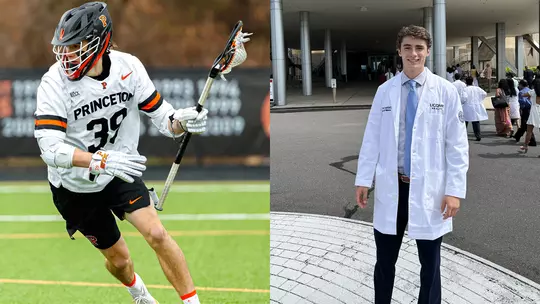
The four former athletes, as well as a few hundred others, are making the transition away from being a Princeton Tiger to their various post-college paths, almost none of which involve professional sports. Davey is an exception, as she plays professionally, for the Hampsted-Westminster team in the English Premiere League for field hockey, on the weekends. Sears has played club lacrosse for the New York Athletic Club. Forbes? There aren’t exactly a lot of rec tackle football leagues out there. Carpenter? He’s lucky if he finds time in his day to get even a small workout in. Even the ones that do play in the pros, like Davey, find themselves in a completely different culture than they knew in college.
Dr. Michael Gross is the clinical and sports psychologist for the Princeton Department of Athletics. His office on Jadwin Gym’s D Level is rather spartan, which seems to be appropriate, since it is a place for introspection, rather than presentation. Dr. Gross speaks with Princeton athletes about any number of topics related to their athletic experience, both positive and negative.
“There are so many valuable life lessons and skills athletes learn via sport participation,” he says. “To name more than a few, there’s commitment, dedication, resilience, perseverance, teamwork, leadership, coachability, time management, effective communication and the ability to perform in high-pressure situations.”
Ford Family Director of Athletics Emeritus Gary Walters referred to that phenomenon as “Education Through Athletics.” This is something that is immediately apparent to a recent grad.
“Being an athlete at Princeton prepared me a ton,” Sears says, speaking for basically every former Tiger. “It taught me to how to learn a lot quickly. It taught me to communicate well, to move on to the next thing. I’m used to rapid-fire, high-pressure situations. All Princeton athletes are. Princeton prepares you so well for that.”
Carpenter is not the only former athlete in his med school class. At UConn medical school, everyone is placed on a team — in his case, Team 18 — and all learning is based around that model.
“That part of the transfer has been easiest,” he says. “Med school is like sipping through a fire hose. You have a lot thrown at you, but you have to retain it. For me, in lacrosse, you have six of you on offense. You learn quickly that you can do more with the six of you than you can by yourself. Here, with the team-based structure, it’s the same.”
As Walters has said for decades, that experience is invaluable.
“If athletes can tune into this and acknowledge this,” Dr. Gross says, “they can realize that even in cases of high athletic identity, they are equipped to navigate the next step in their journey.”
High athletic identity? Princeton is loaded with it. To be a Tiger, you have to be a great athlete in addition to being a great student. There’s more to it than that, of course. Princeton Athletics has produced a winning culture, and those who are part of it are rightfully proud of their place. Walk around the campus, and you’ll see that pride, in the form of sweatshirts, backpacks, coats — all of which project that high athletic identity.
It's not just the identity piece, though. It’s the idea of just how many years, how many practices, how many dreaded run tests, how many games went into getting them to Princeton in the first place — and then how much their time as Tigers meant to them. This happens to everyone who comes through one of the 38 varsity teams, year after year.
“For most student-athletes, the end of an athletic career comes with mixed emotions and a variety of responses,” Dr. Gross says. “On one hand, for many athletes there is excitement about a new career path or journey, greater freedom to use their time as desired, and a sense of relief from performance pressures and sport related obligations. On the other hand, there is a sense of loss. After all, much is lost. There is the loss of structure, loss of daily exercise, loss of social connection, loss of belonging to a group, loss of identity, and loss of easy access to resources like medical care, counseling and nutrition. For some, the latter brings about symptoms of anxiety and depression. For example, an athlete may feel anxious about an uncertain future or lack of structure. Or for some, depression or low mood can arise from less activity, less socializing, lack of social reinforcement, and loss of a sense of meaning and purpose. The research has identified social support, emotional support, planning before the end of an athletic career, exploring athletic identity, and developing healthy coping skills as buffers to challenges athletes may face in their post-athletic-career termination.”
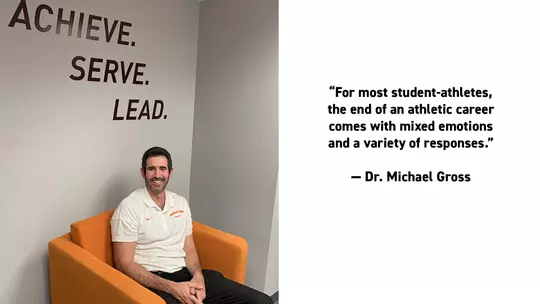
Another term that Walters coined is “athletic mortality.” At Princeton, the “four-year, 40-year” concept is often spoken about by both current undergrads and alums who are decades removed. What about those just out of Princeton?
“Ultimately, I think we can hold the responses athletes have to the end of an athletic career as not black or white, meaning it is not just depressed/anxious or excited about the next chapter,” Dr. Gross says. “We can assume that athletes will experience the full range of what I’ve described, and it is important to create space for all of that. There may be times of excitement and times of mourning some of the losses, but all of that is normal in response to ending an athletic career. That said, for athletes who are really struggling it is beneficial to speak with a counselor, maintain a regular exercise regimen if possible, establish new social relationships and/or maintain those already established, find ways to compete if that’s important to them, consider all the skills learned from sport that can be applied to a career, find new meaningful pursuits, and consider other non-athlete aspects of their identity.”
There are three sides to this athletic mortality: the physical, the statistical and the emotional. The lifting, the practicing — it all builds up over the years. Young bodies are durable bodies, but even they get impacted by the pounding.
“I had a banged-up knee and a bunch of injuries that lingered,” Forbes says. “Covid allowed me to take a year off and then come back for my senior year. My body thought we were done before that. Once the season was over and we had won a championship, I was able to chill and let my body heal. Mentally I love football. Physically it’s tough.”
The statistical? That might not be the right word. Maybe “resume” would be a better word. When it’s over, your career, and your historical place in your program’s history, are settled.
Forbes was a three-year starter and a first-team All-Ivy selection as a senior in 2021, when the Tigers won the second league title with him on the team. He made 102 career tackles and had three interceptions.
Davey finished her career as one of the best Princeton field hockey players ever, not to mention one of the least selfish. She moved from offense to defense to help the team for her final two years, and so what if it impacted her goal scoring. That’s what was best for the team, and she became an All-American on both sides of the field during her career.
She was also a part of teams that won Ivy League championships, reached the Final Four and even played in an NCAA final. Short of having won that NCAA championship, there really isn’t much more that she could have accomplished as a Tiger. Had she wanted, she could have entered the transfer portal and played as a grad student at basically any school in the country.
“I couldn’t imagine playing for another team,” she says. “Plus, I’d been away from my family for five years and wanted to get back. It was time to move on with the next stage of life.”
Sears? She put up 307 career points and 209 career goals, numbers no other Princeton lacrosse player has achieved. Princeton won the league regular season and tournament championships in every season she played. She was a unanimous first-team All-Ivy selection, the MVP of an Ivy tournament and, at the end of her career, the von Kienbusch Award winner as the top female athlete in the Class of 2022. That’s a resume.
“I’m happy with what I accomplished on the field,” she says in her understated way.
“For athletes high in athletic identity, it can be important for them to explore who they are away from their sport and how they can use what sport has taught them in other career pursuits,” Dr. Gross says. “Athletes high in athletic identity may believe that who they are and how people view them is directly associated with statistics, wins and losses, awards, etc. For these athletes, it can be helpful for them to begin to acknowledge that victories, statistics and awards do not bring long lasting happiness, and certainly does not define who they are. General life satisfaction and well-being is more closely associated with our character, our values, our purpose, our attitude, our relationships, with the acknowledgment that much of this is often cultivated through sport.”
This is why the emotional is easily the toughest of the three.
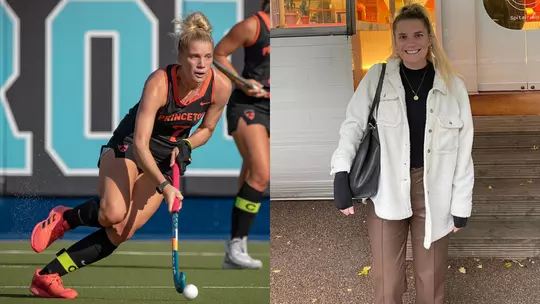
The 2022 NCAA men’s lacrosse Final Four was held in East Hartford, about five miles away from the food court where Weston Carpenter eats and talks, and in fact he is wearing a t-shirt from the event as he does so. Carpenter came to Princeton as a walk-on; as walk-ons go, he’s as good as any Princeton has ever had. A lefthanded attackman, he worked his way into the regular rotation, ultimately playing in that NCAA Final Four as a junior and then on a team that won the Ivy League tournament and returned to the NCAA tournament his senior year, when he had six goals and four assists.
His two best games came in the Ivy tournament, where he first had a huge fourth-quarter assist in a 9-8 win over Penn in the semifinals and then a goal and assist in the win over Yale in the final.
“I’m so grateful that Coach Mads [Matt Madalon] gave me this opportunity,” he says. “He told me if I could hang with the guys that I could be on the team. He didn’t have to do that.”
When Carpenter says he can’t believe that he was a college athlete in 2023, he isn’t grasping the actual reality that it’s barely been four months. A lot has happened in that time.
First, he too made the decision not to enter the transfer portal and use his remaining eligibility, like nine of his classmates did. Instead, he made the rare step of going straight into medical school.
“For me, the ability to trade one identity for another has been really helpful,” he says.
His identity was a lacrosse player since he first started out in the sport in second grade. Forbes began playing football even earlier, in kindergarten. By high school, Sears was the top-ranked player in the country. Davey represented England on its national U16 and U18 teams and was a six-time national age-group champion before she ever reached Princeton.
Most high school athletes never play in college. According to the NCAA, that number is at seven percent. Even fewer become pros. The NCAA has had a very successful marketing campaign around that.
“I was at peace with being in the stands and watching,” Sears says, “but I was envious of them on the field. I wanted to tell them how much fun they’re having and that they’ll be sad when it ends.”
The old habits take a while to go away.
“It was weird,” Forbes says. “The first time I went back to a game, I was thinking ‘I should be in pregame meal now. I should be in the locker room now.’”
Davey, in anticipation of her professional career ahead, trained with the field hockey team last spring, after her Tiger days had ended with an NCAA tournament loss to Syracuse last November.
“That helped a lot,” she says. “That really helped with the transition. Some of my teammates never played hockey again after Syracuse. I at least had that gradual transition of leaving the team, passing it on to the new captain. It kept me very connected to the team.”
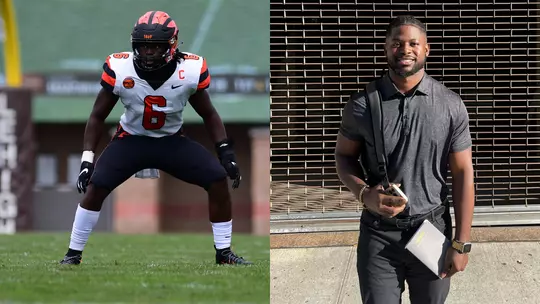
The E-Level tennis courts in Jadwin are an unlikely place for dreams to come true for athletes across all of Princeton’s sports. It is there, though, that many of them wear their Princeton uniform — their actual game-ready, I’ve-arrived, let’s-get-going game uniform — for the first time.
The occasion isn’t a game. It’s for individual pictures. Tough, flexing poses. Smiling poses. Point to the “Princeton” on the jersey poses. Finger pointing poses. If they’re not taken on E-level, then maybe they’re on the side court upstairs or at Baker Rink.
Wherever it is, don’t underestimate how much that means to each and every athlete. All of that work, everything it took to get here, and now they are presented with a tangible reward that was years in the making.
Pick the team. They all gush. Every freshman. It’s mesmerizing for them. Smile for the camera? They’re already smiling.
They only get to put that uniform on a finite number of times. Eventually, they must take it off for good.
They all have a story about how that felt.
Carpenter’s career ended with a 13-12 loss at Penn State in the unforgiving NCAA tournament. The immediacy, the inflexibility of the scoreboard as it gets to all zeroes — those are tough, tough moments. Here’s what he had to say:
It was definitely hard. I had my pads on. I hadn’t taken my helmet off when the buzzer went off. It still felt like we were in the midst of the season. One of the things that helped me adjust was to sit quietly in the locker room afterwards, with all my stuff on. I kept my uniform on as long as possible before I finally had to take it off. I was prioritizing saying my final words to my teammates and coaches. It really sunk in the next day, when there was no more practice. That was a big deal to me.
Sears saw her last game end with a second-round NCAA loss to Syracuse. In her case, her career ended before the game did:
My last game, I fouled out. For a long time I was mad with myself for wasting however many more minutes I could have gotten in the game. But over time, I came to like that I was going hard enough in the game to foul out, and that’s always what I loved most about the sport, being able to be aggressive and leave it all out there. In a way, I’ve come to like that I left my last game like that.
Davey? She was another one whose career ended with the harshness of an NCAA loss:
It was pure sadness, and not just because we lost but because it was all over and I would never get the chance to play with all of my best friends ever again. ‘Don’t cry because it’s over; smile because it happened.’ It was one of those moments.
The dream of every Ivy League football player is to end his final season with a championship. You can win and call it a career right there. Walk off into the sunset. Forbes is one of the lucky ones who got to do that:
On the team we had this sort of corny cliché ‘last one, best one.’ It was supposed to mean if this is your last one, make it the best one. It could be the last rep on bench, the last play of practice, anything. It's kind of lame, I guess, but that whole last game I kept saying to myself ‘make it the best one.’ It wasn’t my best statistical game by any means, but I did find myself trying to soak everything up and be a little more observant of the situation as a whole and not just the game. We stayed on the field taking pictures and talking and the whole works after the game, but I tried to delay taking off my uniform for as long as I could because I knew once football was done, it was done. And I remember just experiencing extreme satisfaction while I was taking everything off. Being able to win a championship with that goal in mind for my last year was one of the most fulfilling moments of my life.
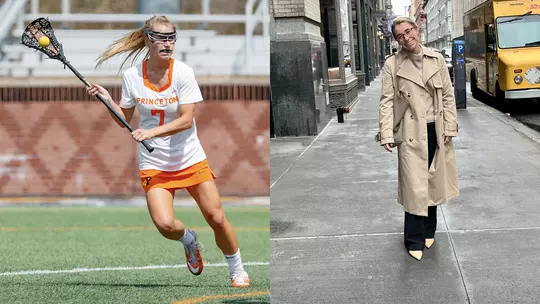
And then off they went, back into their new worlds, the one where they are no longer Princeton athletes.
Forbes has clearly been in the gym, and when he is there, he wears his Princeton football stuff. Sears sometimes does the same with her lacrosse stuff, though she calls it “embarrassing.”
Carpenter played in the alumni game. Davey plays for Hampsted-Westminster.
It’s not the same. It’ll never be the same. It’ll always be a part of who they are, though. The identity may change. The routines may change.
The memories? They stay forever.
As they head back to work or off to study — as they sit in the stands and watch their former teams — that will have to be enough for them.
— by Jerry Price
